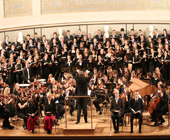Today, music has become a passive pursuit performed by artists and played on myriad electronic devices. It serves as entertainment, stimulation or gratification and has little to do with time or place. We are used to mass-marketed music that has little connection with personal lives. Indeed, many would be hard pressed to name a popular local song or artist. Aside from a few patriotic songs or religious hymns, most people share no common musical heritage or engage in singing on a regular basis.
And yet, music used to be integrated into life and work. Before modern life changed our work rhythms and quicken the pace of life, people sang all the time. Everyone had their songs. Weavers, farm workers, travelers and even beggars had their music through which they told their stories and conveyed lessons.
In describing the role of music in nineteenth century France, historian Eugen Weber tells of how “sung dialogues engaged farmers or shepherds miles apart. Wives recognized their men returning home at eventide by their song. Old people remember that ‘as soon as we were two on the road, we began to sing’” (Eugen Weber, Peasant Into Frenchmen: The Modernization of Rural France 1870-1914, Stanford University Press, Stanford, 1976, p. 429).
Weber notes how song was often functional since it set the pace for work. There were harvest songs, walking songs and working songs that all corresponded to the natural rhythms set by the human heart and lungs. We might also add that song also corresponding to the flux of human emotions so that they might express sorrow and joy, tragedy and celebration. Song was integrated into people’s lives serving to encourage, teach and unite. In the Pyrenees, for example, Weber tells of women who were hired at harvest time not to work but to follow the line of reapers while singing to give them rhythm and heart (ibid. p. 431).
 With the introduction of industrial society, popular music was cut off from lived
experience and locality. Labor was divorced from rhythm. The tempo of
life changed preparing people for the abrupt and more agitated sounds of
jazz and later modern music. Yet more significant, the values of life
changed away from the transcendent and spiritual values of those times.
Music came to reflect the materialistic, massified and more sensual
lifestyles that mark our days. The result is a decline in music, and all
the arts, that once formed an integral part of social life and now are
treated as mere commodities to be sold on the market.
With the introduction of industrial society, popular music was cut off from lived
experience and locality. Labor was divorced from rhythm. The tempo of
life changed preparing people for the abrupt and more agitated sounds of
jazz and later modern music. Yet more significant, the values of life
changed away from the transcendent and spiritual values of those times.
Music came to reflect the materialistic, massified and more sensual
lifestyles that mark our days. The result is a decline in music, and all
the arts, that once formed an integral part of social life and now are
treated as mere commodities to be sold on the market.
* * *
The book, Return to Order, deals
with this abrupt change of life and how we have lost important elements
like music that served to give meaning and purpose to life. While we
cannot return to the historical circumstances of former epochs, we can
return to those timeless principles that can be applied to our days.

No comments:
Post a Comment